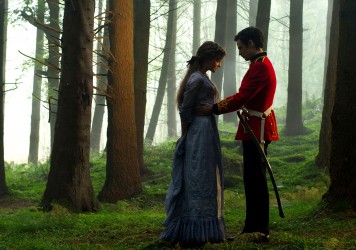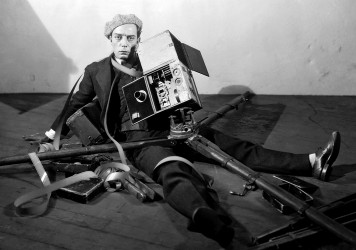Restored, re-released and resplendent. David Lean’s 1962 historical epic is back, and better than ever.
In 1990, following the re-release of the newly restored 1962 cut of Lawrence of Arabia, the American Film Institute honoured David Lean with its Lifetime Achievement Award. The award itself was presented by Steven Spielberg who, in his presentation speech, spoke generously of the formative influence of Lean’s late-period epics on his own filmmaking career, citing Robert Bolt’s screenplay as ‘the best ever written’.
Whether we share Spielberg’s sentiments or simply choose to forgive a hyperbolic attempt at rehabilitating a major filmmaking talent – one who has become more susceptible than most to the undulations of critical favour – it’s interesting to note that the single line of dialogue upon which this monolithic pillar of cinema ultimately hinges is attributable to its director rather than Bolt.
It’s Lean himself who, at the last minute, dubbed the part of the serviceman calling out to Lawrence as he finally reaches the Suez Canal following a near-fatal desert crossing. We see the bizarre juxtaposition of a ship seeming to cross the desert on the horizon, and hear a soldier repeat from afar, “Who are you?” It’s the defining question in a film that paints an intimate portrait of psychological tragedy on one of the grandest, most magnificent canvasses in the history of cinema.
It’s a dazzling work of art, from Freddie Young’s cinematography to John Box’s dressing of the mirage sequence, or Peter O’Toole dancing in the sunlight aboard the crashed train (shot by André De Toth and Nic Roeg’s second unit) as Maurice Jarre’s score swells. From Lean’s single-shot orchestration of the raid on Aqaba to the visual onomatopoeia of cinema’s most breathtaking ‘match’ cut. But of all miracles readily apparent on screen, perhaps the greatest is that the film even got made in the first place.
TE Lawrence was vehemently opposed to the idea of anyone adapting his autobiography ‘Seven Pillars of Wisdom’, for the screen, telling writer Robert Graves in 1935, “I loathe the notion of being celluloided. My rare visits to cinema always deepen in me a sense of their superficial falsity… ‘Vulgarity’, I would have said, only I like the vulgarity that means common man, and the badness of films seems to me like an edited and below-the-belt speciousness.”
Yet the legend of Lawrence of Arabia was one born out of cinema, an heroic enigma who grew in public consciousness less from literary autobiography than from the travelling newsreel roadshows and the lectures of Lowell Thomas, one of the few war correspondents with direct access to Lawrence. By the time Sam Spiegel acquired the rights from the estate trustees in 1959, the story of Lawrence of Arabia had already become the stuff of schoolboy legend, cemented through various stage and biographical investigations (Lean’s own Prince Feisal, Alec Guinness, had even played the title role in Terence Rattigan’s Ross in the West End).
Many valiant but frustrated attempts were made by previous rights-holder Alexander Korda to bring Lawrence’s story to the screen throughout the ’30s and ’40s, but myriad factors – from script disapproval to international relations at the outbreak of war – served to thwart them, leaving it to the propaganda machines of the Soviets (the 1930 film Visitor from Mecca) and Dr Goebbels (Uprising in Damascus) to mount their own assaults on his legacy. Lean and Bolt sought to demythologise Lawrence, to disavow any Kipling-esque, cowboys-and-indians heroism for something that aspired to Shakespearean tragedy, happy to play fast and loose with historical veracity if it served their portrayal of a flawed, neurotic genius – a modern cinematic Hamlet. Theirs is no hagiography.
If there’s one aspect that prevents Bolt’s outstanding screenplay from quite reaching the dizzying pedestal upon which Spielberg places it, it lies in its overstatement of Lawrence’s contradictions, the “no one ever knew him” assertion with which the film begins, building towards the answer, “least of all Lawrence himself”.
O’Toole’s performance never shies from Lawrence’s preening narcissism and arrogance, even barbarism. Yet he effects a remarkable counterbalance both in his compassion and his emotional and strategic intelligence. TE Lawrence himself stipulated in an early contract that there should be no women in his screen story, and Lean obliges by keeping his alleged homosexuality close to the surface. Lawrence’s well-documented masochistic tendencies certainly leave the Deraa rape sequence open to performative interpretation. Whoever TE Lawrence was, Lean’s film remains an interpretation of unparalleled ambition, its 313-day shoot lasting as long as the Arab Revolt itself.
This new 4K restoration of the 227-minute Director’s Cut glistens in a way Lawrence Of Arabia never has before, a concurrent Blu-ray release serving to mock even the most expansive home cinema set-up. It’s a film made for the cinema; a film, in fact, for which cinema itself was made.
Published 22 Nov 2012
A new 4K restoration of David Lean’s beloved 1962 epic.
Still astonishes.
Lawrence has never looked more beautiful.

Carey Mulligan shimmers in an otherwise fairly ordinary adaptation of the Thomas Hardy classic.

Director of the Close-Up Film Centre Damien Sanville offers a possible route to a 35mm revival.

Did we really need David Lean’s turgid, three hour epic back on our cinema screens?